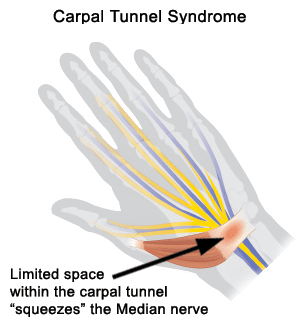Carpal Tunnel Syndrome
Carpal Tunnel Syndrome (CTS) is a very common condition and is becoming more frequent. The carpal tunnel is a narrow tunnel in the wrist where major arteries and nerves pass from the forearm into the wrist. One of the primary nerves that pass through this area is called the median nerve. When the ligaments around the carpal tunnel become tight, pressure is applied to the median nerve causing tingling, pain and even loss of sensation to the thumb and first two fingers of the hand.
One of the primary causes of carpal tunnel syndrome is poor posture and repetitive activities such as typing at a computer in the wrong position for many hours a day. The direct pressure on the wrist from the desk along with the repetitive movement of the fingers can lead to a tightening of the carpal tunnel ligaments.
It is often worse at night or with driving and can lead to loss of grip strength and coordination. As the problem progresses, atrophy (muscle wasting) of the thumb muscles may occur. Although, surgical release of the transverse carpal ligament is often performed before muscle wasting occurs.
Those at risk of developing carpal tunnel often have neck or shoulder problems on that side that lead to altered posture and movement of the arm. Since the median nerve exits from the neck and passes through the shoulder all the way down to your fingers, carpal tunnel is affected by the flexibility of the nerve higher up.

How physical therapy helps
Physical therapy is one of the first lines of defense in treating carpal tunnel syndrome. It is non-invasive and effective in eliminating symptoms and stopping them from returning.
Our physical therapy treatments focus on improving the mobility of the wrist and spacing of the carpal tunnel so the pressure is relieved on the median nerve. Hands on treatments mobilize tight joints and stretch tight ligaments. Ultrasound and other modalities can reduce deep swelling relieving pressure on the nerve. Finally, strengthening and range of motion exercises can support the wrist and maintain good posture, helping the normal function of the median nerve.
We also focus on long-term results by training you on specific exercises to perform at home and work. Additionally, we train you on proper postural technique to prevent future reoccurrences
Hours of Operation
Monday 7:00 - 5:00
Tuesday 7:00 - 12:00
Wednesday By Appointment Only
Thursday 7:00 - 5:00
Friday 7:00 - 12:00
Contact Us Today
570-726-0331
Allow us to help you "Achieve Your Goals"! Give us a call today to schedule an appointment!
Contact Info
© 2019 Chappell Physical Therapy. All rights reserved | Marketing by Mid-Atlantic Marketing Group